When it comes to the best email marketing and automation tools for ecommerce business, Drip and Omnisend are two strong contenders.
Both offer a robust set of features required to create high-converting email marketing campaigns.
But where Drip is limited to email marketing, Omnisend combines email, SMS, and web push into a single workflow. This offers a truly omnichannel marketing experience.
Drip vs Omnisend: which one is the better tool for your ecommerce business?
Let’s find out by doing an in-depth comparison of the features offered by the two and the price they charge.
Drip vs Omnisend: A quick overview
Omnisend has a Shopify rating of 4.8 and is a well-known email automation platform, preferred by ecommerce businesses.
Drip also has a high rating of 4.5 and is a close competitor to Omnisend for email marketing and automation.
Which platform is better for you depends on your specific requirements and budget. This article will help you make an informed decision by comparing the two on various features.
This is just a brief overview, we’ll cover the in-depth comparison in the next section.
Drip vs Omnisend comparison: Feature by feature
In this section, we’ll give you an in-depth comparison of Drip vs Omnisend on the following aspects:
- Ease of getting started
- Building an email campaign
- Marketing automation
- Signup forms and landing pages
- Segmentation
- Analytics
- Customer support
- Integrations
- Compatibility with other marketing channels
We’ll highlight the features offered, a fair comparison, and features that are missing from each tool (if any). Let’s get started.
Now, let’s delve into a detailed examination of the features offered by these two platforms.
Ease of getting started
Both platforms provide a seamless signup process and don’t ask for the credit card information.
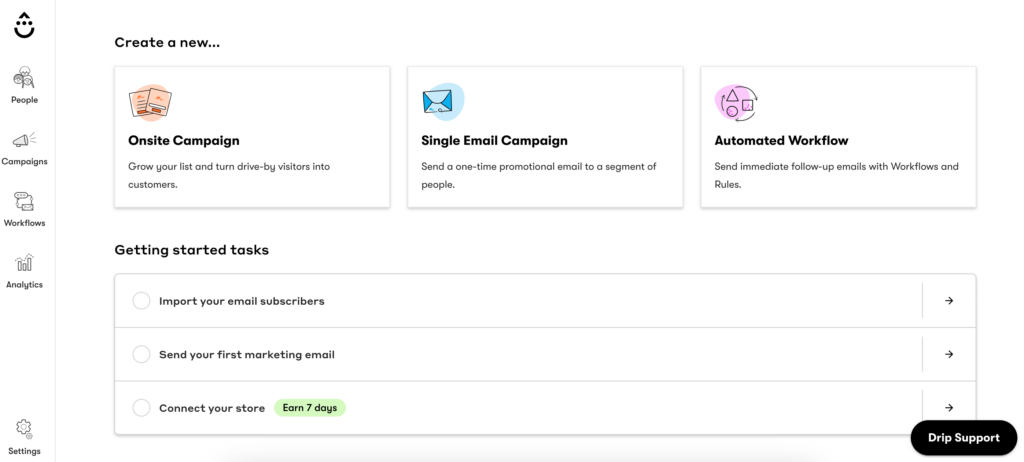
When signing up for Drip, you simply need to provide important business information, such as your legal business address, name, and email address. There is no free plan, but you can test the platform during the free 14-days trial.
The interface is easy to navigate with four categories in the main menu and self-explanatory sub-categories. When you start, Drip gives three options for the various things you can do on the platform and provides video tutorials to help with each.
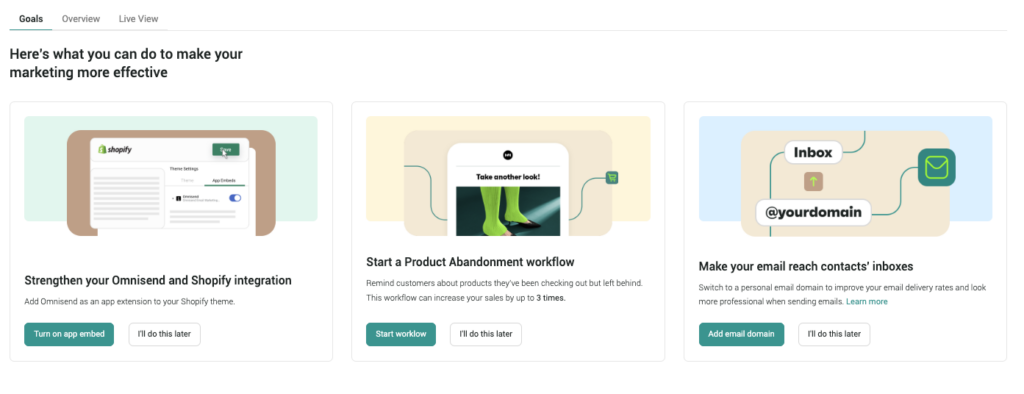
On Omnisend you won’t find a free trial. There is a free plan with unlocked features to test them out.
Omnisend’s user interface is equally easy to navigate and user-friendly. Given that the platform is designed for ecommerce businesses, most features make sense when you connect your ecommerce store.
It’s a tie as both tools offer a simple, easily navigable interface great for experts and beginners alike.
Building an email campaign
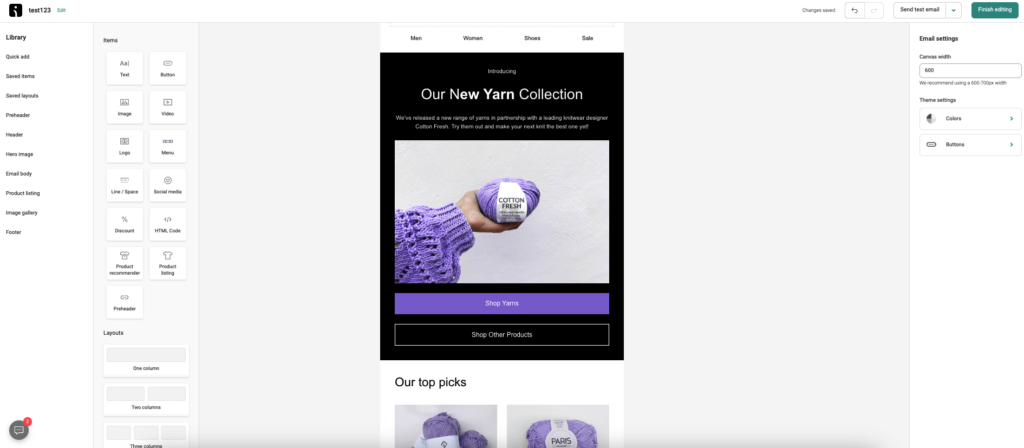
Building a campaign with Omnisend is a breeze. And if you have an online store, there are tons of features that will give you a competitive edge. Some examples include:
- Product picker: It allows you to add products to your emails directly from your store.
- Brand assets: It automatically adds your branding to your emails.
- Campaign booster: It allows you to automatically resend emails to non-openers.
- Unique discount codes: This enables you to offer customized discounts and offers to different customers or customer segments.
When compared with Omnisend, Drip’s email-building capabilities are lacking. It doesn’t offer much in terms of personalization and even customizing emails is not very easy.
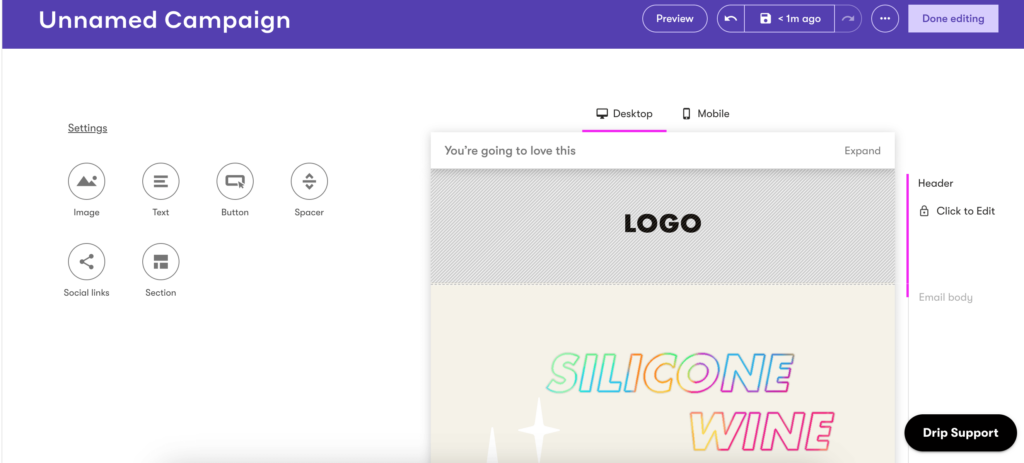
For instance, if you choose a template with one column, you won’t be able to add content elements with two columns.
It also doesn’t offer important features like product recommendations and product listing.
In terms of templates, Drip offers 50+ templates while Omnisend has expanded its collection to 130+ for various occasions and purposes.
Omnisend is the clear winner here as it not only offers all basic and advanced email marketing features but also features designed for ecommerce brands. Drip, however, lacks many important features.
Marketing automation
Both Drip and Omnisend offer robust automation features and ready-to-use pre-built automated workflows.
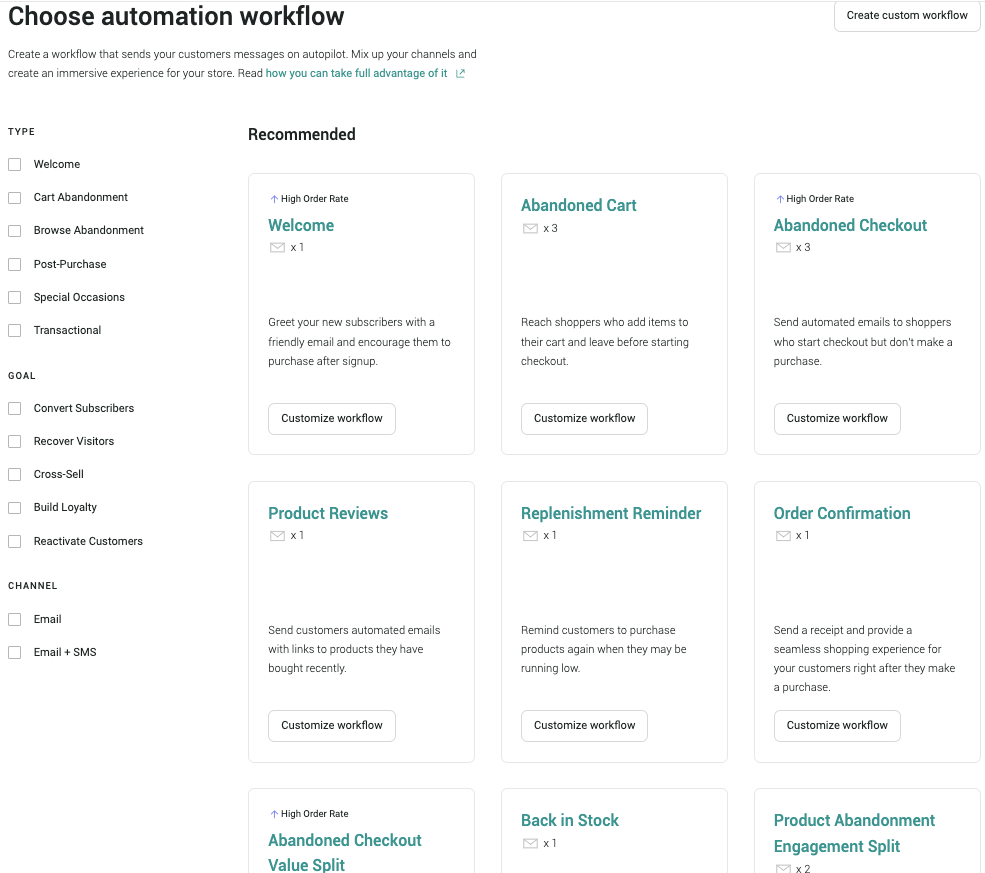
The only difference is that Omnisend offers templates with content that you can use out of the box. Drip offers a larger number of logic-based workflows, but you need to add content yourself.
Aside from that, they’re practically head-to-head when it comes to automation capabilities. We didn’t find any important features missing from either tool.
Take a look at this side-by-side comparison table to see what each tool offers.
This is a tie as both tools offer really good automation features.
Signup forms and landing pages
When it comes to forms and landing pages, both platforms are equally strong. Gamification forms, multi-step popups, beautiful templates—these platforms have them all.
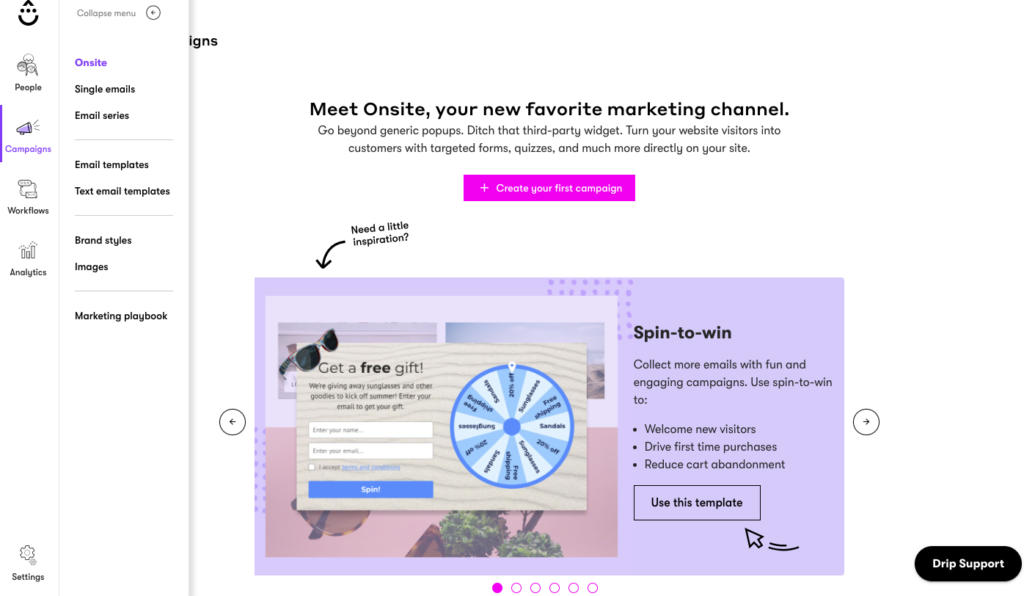
On Drip, additionally, you will find countdown timers, smoothly timed sidebars and slide-ins, quizzes.
But Drip doesn’t offer a landing page builder, which is a major drawback.
Here’s a side-by-side comparison of the features offered by Drip and Omnisend.
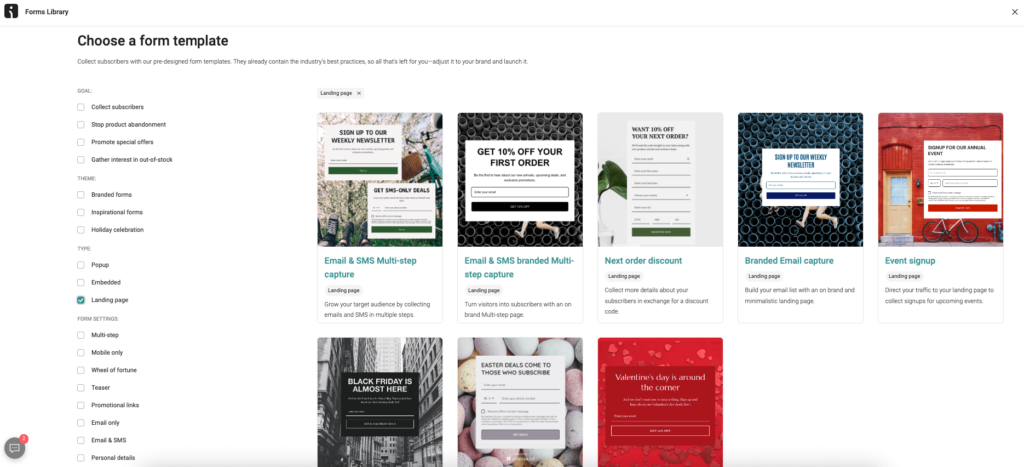
Both Omnisend and Drip offer easy list management and contact tagging options. They also provide basic form analytics and track important metrics like signups.
While both Drip and Omnisend go head-to-head when it comes to designing and gamifying signup forms, the lack of a landing page builder puts Drip behind.
Omnisend is the winner, mainly because it also offers a robust landing page builder.
Segmentation
Drip offers robust segmentation capabilities and allows you to segment based on various factors, such as:
- Email activity
- Orders and products
- Review activity
- Loyalty programs
- Segments and workflows
- Onsite forms
- Events
- Person tags, and fields
Omnisend offers six segmentation options, with numerous filters. These are:
- Channels
- Shopping behavior
- Email campaign activity
- SMS campaign activity
- Contact properties
- Web browsing activity
You can use various tags and filters to create numerous segments.
Before we go in-depth with this Drip vs Omnisend comparison, let’s first get an overview of what each had to offer.
When it comes to segmentation, the more ready-to-use templates you have, the easier it is for you to run highly-targeted campaigns.
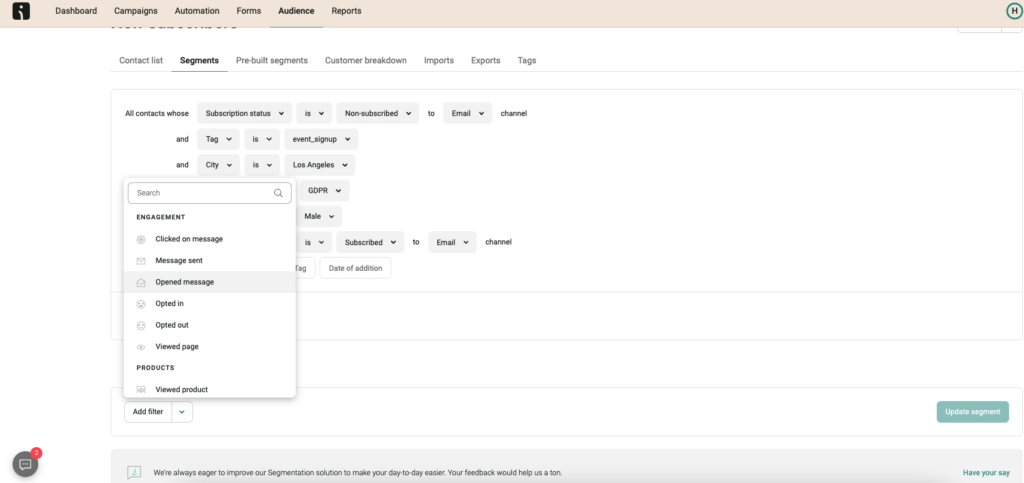
Omnisend shines in this department. It offers 23 prebuilt segments that you can use out of the box. Drip also offers a few basic segments, but mostly the job of building segments is on you.
While both tools offer numerous segmentation options, the ready-to-use segments that Omnisend offers make things much simpler for the users.
Omnisend wins this round as well.
Analytics
Drip offers decent analytics capabilities and allows you to track key metrics, such as:
- Email campaign engagement
- Total revenue
- Average order value
- Unsubscribes
- Clicks by link
- Recent activity metrics
- Site traffic
- Conversions
Apart from the basic analytics, Omnisend offers some ecommerce-specific metrics as well. Some examples include:
- Click map report
- Sales and order numbers from each campaign
Omnisend also offers advanced reporting, including unique reports like Customer Breakdown Report.
Though Omnisend offers some unique ecommerce-specific features, Drip has everything an email marketing tool should offer. So, it’s a tie.
Customer support
Here are the customer support options that Drip offers:
- 24/5 email support for all paying customers from 9 am to 5 pm CT
- 24/5 live chat support from 9 am to 5 pm CT for customers on the $99/mo+ plans
- Live walkthrough of the platform every Tuesday and Thursday
It doesn’t offer weekend support, phone support, and any support to free trial plan users.
Now, let’s take a look at the supports options that Omnisend offers:
- 24/7 live chat and email support for all customers (free or paid)
- Video tutorials, blog, and other online learning resources
Omnisend boasts award-winning support and a median first-response time of fewer than 3 minutes. It also doesn’t offer phone support though.
Omnisend is the clear winner here as it offers 24/7 support to all customers, while Drip only offers 24/5 support even to paid customers.
Integrations
Omnisend provides integration with over 130 tools and apps. This includes seamless integrations with all major ecommerce platforms, as the tool is designed for ecommerce.
Its Zapier integration allows you to connect your entire tech stack, beyond the direct integrations that Omnisend offers.
Drip also offers over 150 integrations with different types of tools and apps. Though most of these integrations are offered through Zapier and aren’t direct integrations.
It integrates with key ecommerce platforms, such as Shopify, WooCommerce, and BigCommerce.
Though Omnisend offers more direct integrations, both tools allow you to easily connect your favorite apps.
Compatibility with other marketing channels
Drip is an effective email marketing and automation tool, but it’s not the best option for omnichannel marketing.
Omnisend goes beyond email marketing and combines email, SMS, and push notifications into a single workflow. You can use it to create omnichannel automated marketing campaigns.
What’s more, is that you can also retarget users who abandoned their carts via Facebook Ads and Google Ads.
Omnisend wins this round.
Price Comparison
Till now in this Drip vs Omnisend comparison, we’ve compared the two tools on their key features. But this comparison won’t be complete till we compare the prices and the plans offered by the two.
So let’s get right to it.
We’ll first compare the free plans or trials and then discuss the paid plans.
Free plans comparison
While Omnisend offers a free forever plan with access to all features (except advanced reporting), Drip only offers a 14-day free trial.
If you don’t need to send more than 500 emails in a month, you can keep using Omnisend’s free plan forever.
The best part is that it doesn’t restrict access to any features, so you can test its full set of features on the free plan. The same goes for Drip as well, as it only restricts the number of emails.
Omnisend offers great customer support to users on its free plan, while Drip doesn’t offer any support at all.
Here’s a quick comparison of Drip’s free trial versus Omnisend’s free plan.
Comparison of free plans
- No credit card required
- Access to most features, except unlimited emails
- No customer support
- 500 monthly emails
- 250 contact limit
- 60 free SMS credits
- 500 web push notifications
- 24/7 email and chat support
- Access to all features (except advanced reporting)
When comparing what you get for free, Omnisend is the clear winner. You get everything that paid users get and there’s no time limit for how long you can stay on the free plan.
Paid plans comparison
Here, we’ll compare the paid plans offered by the two and the inclusions for each.
Drip doesn’t offer tiered plans and has a single plan. The price increases with the number of contacts.
The same with Omnisend, you get all features on all plans. On a standard plan you get 12x your list email sends. The only advanced reporting is limited to Pro plan which is more expensive and allows you to send more texts and emails.
Let’s say your contact list has 10K contacts. Omnisend’s Pro plan will cost you $150 and you’ll get unlimited emails and web push notifications, and 6,000 SMS credits. With Drip, you’ll need to pay $154 for emails only.
Clearly, you’re getting much more value with Omnisend as it also offers additional marketing channels for the same price.
Another important thing to note is that Omnisend offers something for businesses of all sizes. Not everyone requires unlimited emails. If you have a small contact list and fewer monthly email requirements, you can get a much better deal with Omnisend.
Omnisend wins again as it offers SMS and web push notifications as well, for a similar price.
Summary: Which one wins?
Here’s a quick comparison table summarizing the key features and pricing of Omnisend and Drip.
3.8
4.8
500 contacts – $39
1,000 contacts – $39
5,000 contacts – $89
10,000 contacts – $154
50,000 contacts – $699
100,000 contacts – $1,199
500 contacts – $16
1,000 contacts – $20
5,000 contacts – $65
10,000 contacts – $115
50,000 contacts – $330
100,000 contacts – $720
- Paid plans only
- 14-day free trial
- 500 monthly emails
- 250 contact limit
- 60 free SMS credits
- 500 web push notifications
- 24/7 email and chat support
- Access to all features
- Robust marketing automation
- Advanced segmentation
- Easy to get started and use
- Robust marketing automation
- Advanced analytics
- Aesthetic form and landing page templates
- Comparatively expensive, given the features offered
- Other tools offer better email builders
- No landing pages
- No support for free trial users
- More expensive than basic email marketing tools
- No geolocation report
- Well-established ecommerce businesses
- Ecommerce businesses of all sizes
- Freelancers
- Non-profit organizations
- Small businesses
- Solopreneurs
- Bloggers
- Non-ecommerce businesses
Drip is a powerful email marketing and automation tool suitable for established businesses with an alocated marketing budget. It offers everything you need to run successful automated email campaigns.
Omnisend is an omnichannel marketing tool designed specifically for ecommerce businesses. Apart from email marketing, it offers SMS and web push notifications, and also ad retargeting. If you want to reach your prospects on multiple channels using a single automated workflow, Omnisend is the better choice.
So what are you waiting for?
Compare the features offered by Omnisend and Drip and make the right choice depending on your needs.
Read full reviews
Related picks for you
Our team strives to be accurate and unbiased in reviewing email tools. However, we recognize that mistakes can happen, and it’s essential for us to stay up to date. If you come across any errors or things that need to be reviewed again, please let us know.





Leave a Reply